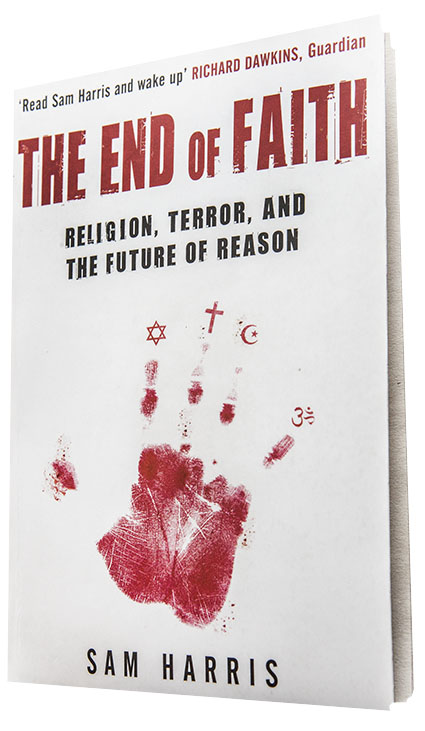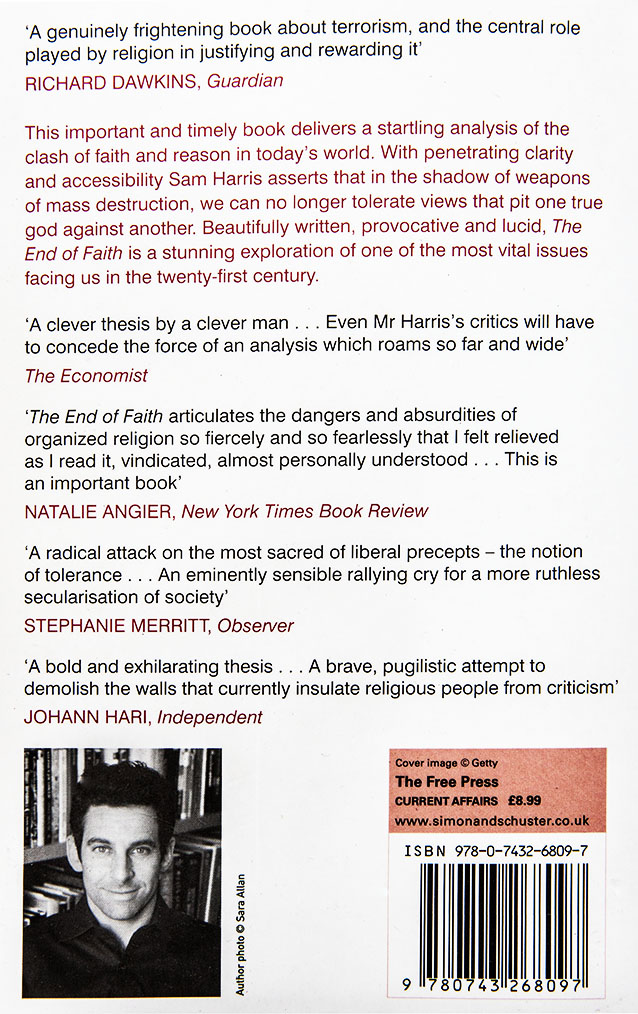418 Sam Harris, The End of Faith ... The Problem with Islam
The End of Faith
In last weeks’ blog I called The End of Faith by Sam Harris a truly shocking book, here’s why: His chapter The Problem with Islam (one must remember the book was published in 2004, Harris had begun writing it shortly after, and probably in response to, 911) makes the point that there is a fundamental difference between your average violence against individuals or the public at large, and Islamic violence. In talks since the publication he cites the example of Buddhists violating Muslims in Eastern Burma (Myanmar), versus the Islamic violence against ‘infidels’ (non-believers), apostates (people who renounce Islam) etc. The first example, he says, is violence that could be perpetrated by anyone against anyone, driven by perceived or real inequalities, but is not prescribed by the tenets of Buddhism; indeed, nowhere is there written a call to violence in the Buddhist canon.
It’s a totally different story, Harris says, with Islam. The ‘holy’ book of Islam, the Quran, is full of calls to jihad, which is now-a-days - and by the Islamic fundamentalists we’re talking about - interpreted as war against the West.

“The feature of Islam that is most troubling to non-Muslims, and which apologists for Islam do much to obfuscate, is the principle of jihad. Literally, the term can be translated as ‘struggle’ or ‘striving’, but is generally rendered in English as ‘holy war’ and this is no accident. While Muslims are quick to observe there is an inner (or ‘greater’ jihad), which involves waging war against one’s own sinfulness, no amount of casuistry (I had to look it up, casuistry: the use of clever but unsound reasoning, esp. in relation to moral questions; sophistry) can disguise the fact that the outer (or ‘lesser’) jihad - war against infidels and apostates - is a central feature of the faith. Armed conflict in ‘defense of Islam’ is a religious obligation for every Muslim man … the call to jihad is an unambiguous call to world conquest.” He quotes Bernhard Lewis: “The presumption is that the duty of jihad will continue … until all the world either adopts the Muslim faith or submits to Muslim rule.” Harris: “There is no denying that Muslims expect victory in this world, as well as in the next.”
Furthermore - and this is perhaps the most troubling aspect of Islam, says Harris - is the notion of the afterlife - after ‘martyrdom’ (getting killed in the fight for Allah’s cause) - being so much more rewarding than life in this world. Harris quotes a Hadith: “Nobody who dies and finds good from Allah (in the Hereafter) would wish to come back to this world even if he were given the whole world and whatever is in it, except the martyr who, on seeing the superiority of martyrdom, would like to come back to the world and get killed again (in Allah’s Cause).” Harris: “Many hadiths of this sort can be found, and Islamists regularly invoke them as a justification for attacks upon infidels and apostates.”
So, here we are: Harris paints a most troubling picture of the obligation for every Muslim to fight jihad being imbedded in the tenets of their faith. This is a big deal, because - in Harris’ view - there is no escaping the outcome: Attacks by devout Islamists (against the West) who do not fear death - indeed, who seek death (martyrdom) - will not abate … and remember, this book was written well before the rise of ISIL (the so-called Islamic State).
The reason why I find this stance on faith so shocking is because it counters all my beliefs of tolerance. Throughout my writings I espouse the notion that “everyone has a right to their belief”, as long as - and this becomes very pertinent in view of Harris’ book - “as long as they don’t impinge on the beliefs of others (or indeed their lives).”
I do believe (yes, I still do) that in our (Australian) multicultural society we are a step ahead of the rest of the world, where tensions with Islamic fundamentalist make for frightening encounters with jihadist dogmatism (notwithstanding our incident of a wannabe jihadist in Sydney terrorising Lindt-café patrons this week.)
I have an essay BELIEF and another one TOLERANCE in my book with no tile but instead three definition for the term en.light.en.ment … but I had a foreboding of what faith may entail, when I wrote: “Should you ever get killed by a suicide bomber, it’s … because of faith” in my essay on FAITH
